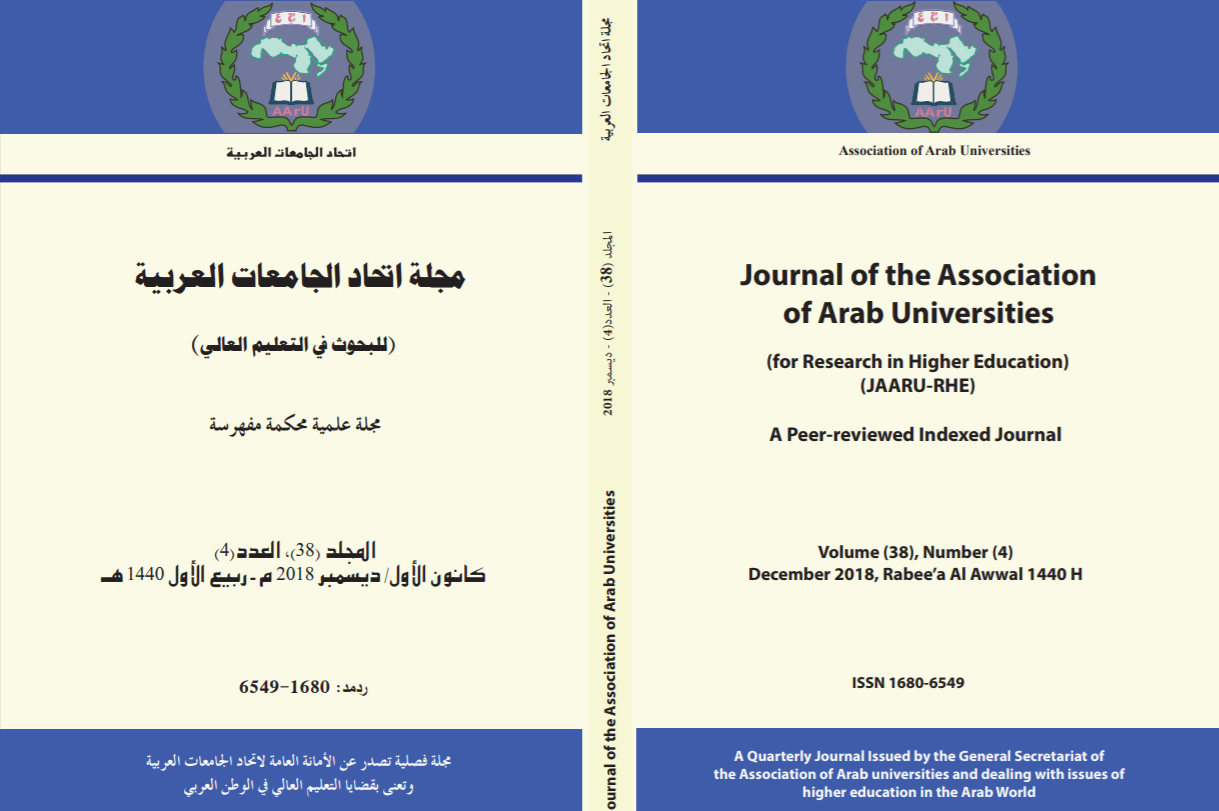Journal of the Association of Arab Universities for Research in Higher Education مجلة اتحاد الجامعات العربية للبحوث في التعليم العالي

Abstract
هدف المقال إلى التحقق من أنموذج سببي مقترح لتفسير العلاقة بين التفكير ما وراء المعرفي والكفاءة الذاتية الأكاديمية لدى طلبة الجامعات الأردنية في ضوء توجهاتهم الهدفية. تم استخدام المنهج الوصفي الارتباطي، وشملت عينة الدراسة (1239) طالبًا وطالبة من طلبة البكالوريوس في الجامعات الأردنية، واستخدمت الدراسة مقاييس التفكير ما وراء المعرفي المستخدم في دراسة الجراح وعبيدات (2011)، والكفاءة الذاتية الأكاديمية، والتوجهات الهدفية، وأظهرت النتائج بأن مستوى التفكير ما وراء المعرفي والكفاءة الذاتية الأكاديمية جاء بمستوى متوسط لدى أفراد عينة الدراسة، وأشارت النتائج إلى أن أكثر التوجهات الهدفية تكرارًا لدى طلبة الجامعات الأردنية، بُعد أسلوب التعلم، ثم بُعد تجنب التعلم، ثم بُعد أسلوب الأداء، وبالمرتبة الأخيرة جاء بُعد تجنب الأداء. وأشارت النتائج إلى مطابقة جيدة بين النموذج المقترح وبيانات عينة الدراسة، ووجود تأثيرات مباشرة ووسيطة، بين متغيرات الدراسة، إذ بلغ تأثير التفكير ما وراء المعرفي على التوجهات الهدفية (0.14)، أما تأثير التفكير ما وراء المعرفي على الكفاءة الذاتية الأكاديمية فقد بلغ (0.05)، وبلغ تأثير التوجهات الهدفية على الكفاءة الذاتية الأكاديمية (0.59)، وفسر النموذج المقترح ما نسبته36% من الكفاءة الذاتية الأكاديمية لدى طلبة الجامعات الأردنية
The article aimed to verify a proposed causal model to explain the relationship between metacognitive thinking and academic self-efficacy among Jordanian university students in the light of their goal orientations. the correlational descriptive approach was used, and the study sample included (1239) male and female undergraduate students in Jordanian universities, and the study used the measures of metacognitive thinking used In the study of AlJarrah & Obeidat (2011), academic self-efficacy, and target orientations, the results showed that the level of metacognitive thinking and academic self-efficacy came at an average level among the members of the study sample, and the results indicated that the most frequent target orientations among Jordanian university students, after the learning style, then after avoiding learning, then after the performance style, and in the last place came after avoiding performance. The results indicated a good match between the proposed model and the data of the study sample, and the presence of direct and intermediate effects, between the variables of the study, as the effect of metacognitive thinking on the target orientations was (0.14), while the effect of metacognitive thinking on academic self-efficacy reached (0.05), and the impact of objective orientations on academic self-efficacy reached (0.59). The proposed model explained 36% of the academic self-efficacy of Jordanian university students
Recommended Citation
Alrawashdeh, Amin Lafee Hammad and Alyousef, Rami Mahmuod
(2024)
"التحقق من أنموذج سببي مقترح لتفسير العلاقة بين التفكير ما وراء المعرفي والكفاءة الذاتية الأكاديمية لدى طلبة الجامعات الأردنية في ضوء توجهاتهم الهدفية,"
Journal of the Association of Arab Universities for Research in Higher Education مجلة اتحاد الجامعات العربية للبحوث في التعليم العالي: Vol. 44:
Iss.
3, Article 14.
Available at:
https://digitalcommons.aaru.edu.jo/jaaru_rhe/vol44/iss3/14

